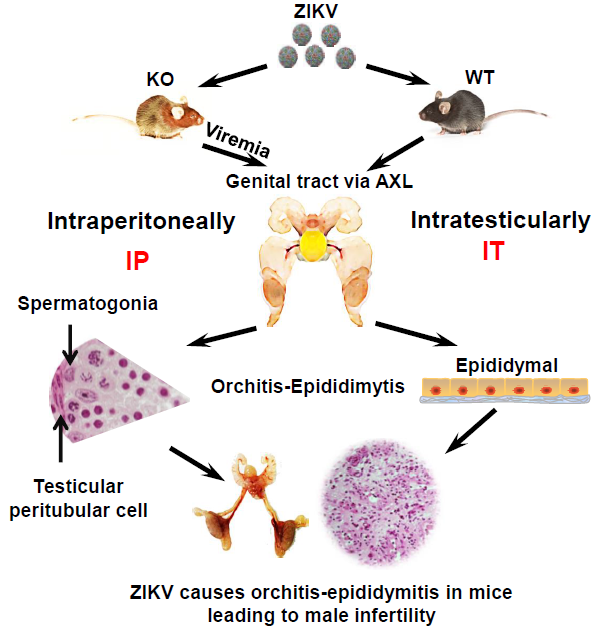On November 22, 2016, a ground-breaking article was published online in Cell, an internationally-renowned scientific journal, by the research groups of Professor George Fu Gao from the institute of Microbiology, Chinese Academy of Sciences (CAS), and Professor Xiangdong Li from China Agricultural University (CAU). The study was entitled: “Zika Virus Causes Testis Damage and Leads to Male Infertility in Mice”, and describes how infection with Zika virus in mice can lead to acute and chronic testicular damage, eventually leading to infertility. These findings provide new insight into the pathogenic mechanisms of Zika virus disease.
Currently, Zika virus infections are associated with microcephaly in newborns and Guillain-Barré Syndrome in humans. However, the study by Professors Gao and Li show that Zika virus can also cross the blood-testes-barrier under certain conditions (ie. immunodeficiency), and infect the reproductive tract in male mice. Acute orchitis/epididymis was observed beginning at 8 days after infection along with decreased levels of testosterone, with symptoms persisting at 16 days after infection. At 30 days after infection, a breakdown in the morphology of the testes and disruption of the seminal vesicles can be observed, resulting in completely atrophied testes and seminal vesicles by 60 days after infection.
Further studies show that Zika virus can infect the testes and epididymis, but not the prostates or seminal vesicles in the male reproductive tract. Specifically, Sertoli, Leydig, and epididymal epithelia cells secrete large quantities of cytokines/chemokines after Zika virus infection, which may have contributed to the observed damage in the testes/epididymis. In contrast, peritubular cells and spermatogonia did not secrete cytokines/chemokines after Zika virus infection, suggesting that these cells may harbour Zika virus, allowing the virus to persist in the male genital tract.
Zika virus is closely related to Dengue virus, Japanese encephalitis virus, and West Nile virus, all of which are transmitted primarily via mosquito bites. However, the observation that Zika virus can also persist in the semen of convalescent male patients suggest that this pathogen can also be sexually transmitted. The study by Professors Gao and Li supports this hypothesis, and highlights the fact that more studies are needed in order to completely understand all mechanisms of Zika virus pathogenesis.

URL: http://www.cell.com/cell/fulltext/S0092-8674(16)31537-9
Zika virus infection damages testis and potentially results in male infertility in mice(Image by Prof. Gao’s group)
Contact:
Dr.Prof.GAO Fu
CAS Key Laboratory of Pathogenic Microbiology and Immunology,Institute Of Microbiology,Chinese Academy of Sciences,100101,Beijing, China
E-mail: gaof@im.ac.cn
